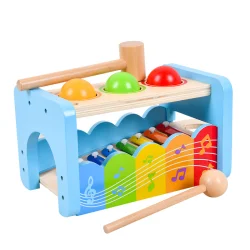What are Montessori educational toys?
2023-10-31
Montessori educational toys are toys and learning materials that align with the educational philosophy and methods developed by Dr. Maria Montessori, an Italian physician and educator. Montessori education emphasizes child-centered, self-directed learning and hands-on exploration. Montessori educational toys are designed to promote independent learning, foster creativity, and encourage children to explore and discover at their own pace. Here are some key characteristics of Montessori educational toys:
1. Purposeful and Self-Correcting: Montessori toys are carefully designed to have a clear purpose and provide children with the opportunity to learn and practice specific skills. They are often self-correcting, meaning that children can identify and correct their own mistakes, fostering independence and problem-solving skills.
2. Natural and Sensory-Focused: Montessori materials often use natural materials like wood, metal, and cloth to engage a child's senses. They aim to provide a sensory-rich learning experience, promoting tactile exploration and a connection with the natural world.
3. Open-Ended and Versatile: Montessori toys are typically open-ended, meaning they can be used in a variety of ways, allowing children to explore and create based on their interests and developmental stage. Open-ended toys encourage creativity and imagination.
4. Developmentally Appropriate: Montessori educational materials are designed to match a child's developmental stage and individual readiness. They are often grouped into different "sensorial," "practical life," "language," and "math" categories, tailored to specific learning goals.
5. Order and Sequence: Montessori materials are organized in a logical order or sequence, which helps children progress from simple to complex concepts and skills. This sequential approach supports a child's natural curiosity and development.
6. Hands-On Learning: Montessori toys emphasize hands-on learning. They encourage children to manipulate and explore objects, fostering fine motor skills, coordination, and a deeper understanding of concepts.
7. Independence and Concentration: Montessori philosophy values a child's ability to work independently and concentrate on tasks. Educational toys are designed to support these qualities, allowing children to engage in focused, self-directed activities.
8. Montessori Principles: Educational toys that align with Montessori principles may include materials for practical life activities (e.g., pouring, spooning), sensorial exploration (e.g., color tablets, geometric shapes), language development (e.g., sandpaper letters, movable alphabets), and math concepts (e.g., number rods, counting beads).
9. Minimalist and Aesthetically Pleasing: Montessori materials are often minimalist in design, focusing on simplicity and aesthetics. The idea is to create an environment that is calm and visually appealing to enhance the learning experience.
Montessori educational toys are commonly used in Montessori schools and in home environments where parents and caregivers follow Montessori principles. They are believed to foster a love of learning, independence, and a deep understanding of concepts. While Montessori materials are associated with a specific educational philosophy, many parents and educators find value in incorporating Montessori-inspired toys and activities into a child's play and learning experiences.



